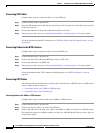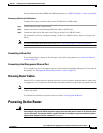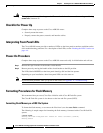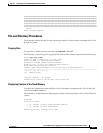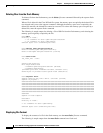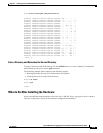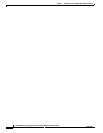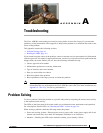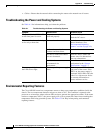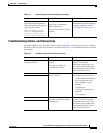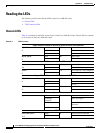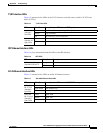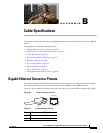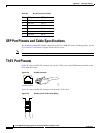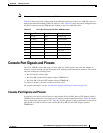
A-2
Cisco ASR 901 Series Aggregation Services Router Hardware Installation Guide
OL-23778-01
Appendix A Troubleshooting
Problem Solving
• Cables—Ensure that the external cables connecting the router to the network are all secure.
Troubleshooting the Power and Cooling Systems
See Table A-1 for information to help you isolate the problem.
Environmental Reporting Features
The Cisco ASR 901 router has a temperature sensor to detect over temperature conditions inside the
chassis. The over temperature detection triggers an alert at 70°C. This condition is reported to the
processor as an interrupt, where software takes action to generate the appropriate alarms. If the router
reaches a temperature of 85°C, the power supply will cycle to prevent the router from exceeding that
temperature while being powered up state. See
Table A-2 for help in interpreting environmental
reporting features.
Table A-1 Troubleshooting the Power and Cooling Systems
Symptom Possible Cause Corrective Action
The power (labeled PWR) LED
on the front panel is not on.
The power source is not
connected properly.
Check the DC input.
Check the DC source.
The router shut down after being
on for only a short time.
The cause is environmental. Check for an environmentally
induced shutdown. (See
“Environmental Reporting
Features” section on page A-2).
The fans do not work; the router
overheats and shuts down.
Check the fans.
The chassis intake and exhaust
vents are obstructed.
Check the chassis intake and
exhaust vents for obstructions.
Clear any obstructions.
Installation does not meet
environmental site
requirements.
Check the environmental site
requirements in the
“System
Specifications” on page -7.
The router partially boots, but
the LEDs do not light.
There is a possible power supply
failure.
Check the power LED on the
front panel of the router. If the
LED is on, the power supply is
functional. If the LED is off, refer
to the Cisco Information Packet
for warranty information or
contact customer service.



